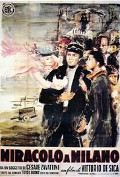
Italy 1951
Directed by
Vittorio De Sica
101 minutes
Rated G
Reviewed by
Bernard Hemingway

Miracle In Milan, A
Although it won the Grand Prix at Cannes and was voted Best Foreign Film by the New York Film Critics in 1951, A Miracle in Milan is very much of its time, a comic fairytale, that, the core subject of homelessness aside, with its urban wastelands (evocatively captured by Aldo Graziati's cinematography), gallery of vagrants and Alessandro Cicognini's organ music suggests Fellini more than it does one of the pioneers of Italian neo-realism.
Based on the novel by Cesare Zavattini it tells the story of the newborn Totó (Francesco Golisano) who is found in a cabbage patch by an old woman who raises him until she dies. Still a child Totó is sent off to an orphanage and emerges from it a fresh-faced simpleton who ends up living in a shanty town on the edge of Milan where as the acknowledged leader of a rag-tag group of homeless people he ends up performing miracles as they face eviction by a rapacious land developer. Totó's cry of "la vita e bella" sums up the film's message/
De Sica with no trace of the urgency and pathos of his previous film, the classic The Bicycle Thieves, is happy to gild social realities with apparently guiless escapism. Perhaps in the post-war setting of Italy, where the approach might have been taken with a certain amount of irony, this made sense. Today it seems a whimsically eccentric work that would not be out of place in a religion class.
DVD Extras: A contemporary news item on the film's premier; interviews with the director's son, Manual De Sica, and Brunella Bovo who starred in the film as Edvige; and the theatrical trailer.
Available from: Umbrella Entertainment
Want something different?





